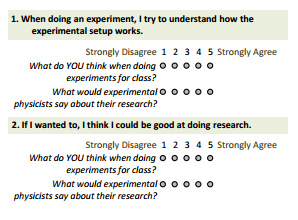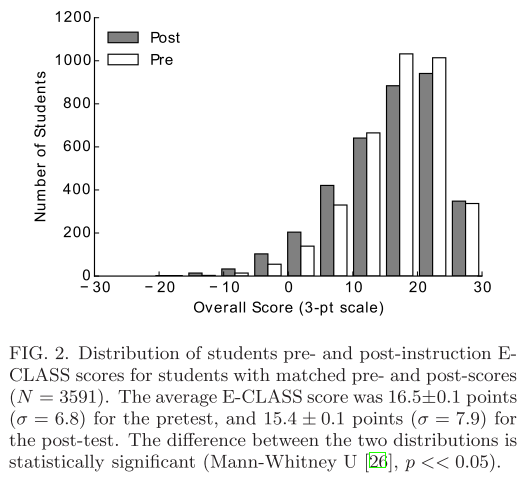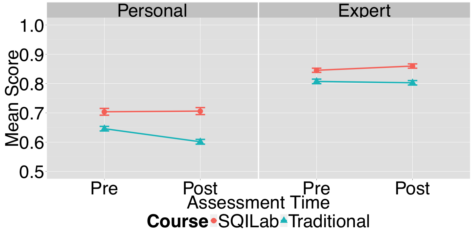Developed by Ben Zwickl and Heather Lewandowski
| Purpose | To assess students’ perceptions of the gap between classroom laboratory instruction and professional research. |
|---|---|
| Format | Pre/post, Multiple-choice, Agree/disagree |
| Duration | 15 min |
| Focus | Beliefs / Attitudes (affect, confidence, math-physics-data connection, physics community, uncertainty, troubleshooting, argumentation, experimental design, modeling) |
| Level | Upper-level, Intermediate, Intro college |
Sample question from the E-CLASS:
Everything you need to know about implementing the E-CLASS in your class.
more details
This is the highest level of research validation, corresponding to all seven of the validation categories below.
Research Validation Summary
Based on Research Into:
- Student thinking
Studied Using:
- Student interviews
- Expert review
- Appropriate statistical analysis
Research Conducted:
- At multiple institutions
- By multiple research groups
- Peer-reviewed publication
The Likert-scale questions on the E-CLASS were developed based on consensus learning goals defined by faculty at the University of Colorado at Boulder for their lab curriculum. The questions were modeled after questions on the CLASS and based on common challenges instructors observed students having in lab courses. The E-CLASS was tested in over 40 student interviews with physics majors, non-majors and introductory physics students to ensure questions were being interpreted in the way intended. Further, over 20 experts reviewed the E-CLASS and indicated their view of the expert-like response for each question. Students in upper-division physics labs gave a larger fraction of expert-like responses than students in algebra-based physics labs in both the classroom context and in the context of professional research. The E-CLASS was given to over 5500 first year, intermediate and upper-division students (about 3500 matched pre and post) at over 45 institutions and appropriate statistical analyses of reliability and discrimination were performed. Reasonable results were found. The E-CLASS has been given to over 5500 students at over 45 institutions with results published in 6 peer-reviewed papers.
References
- J. Aiken and H. Lewandowski, Data sharing model for physics education research using the 70 000 response Colorado Learning Attitudes about Science Survey for Experimental Physics dataset, Phys. Rev. Phys. Educ. Res. 17 (2), 020144 (2021).
- V. Borish, A. Werth, N. Sulaiman, J. Hoehn, and H. Lewandowski, Undergraduate student experiences in remote lab courses during the COVID-19 pandemic, Phys. Rev. Phys. Educ. Res. 18 (2), 020105 (2022).
- D. Doucette, R. Clark, and C. Singh, What’s happening in traditional and inquiry-based introductory labs? An integrative analysis at a large research university, presented at the Physics Education Research Conference 2018, Washington, DC, 2018.
- D. Doucette, R. Clark, and C. Singh, What Makes a Good Physics Lab Partner?, presented at the Physics Education Research Conference 2020, Virtual Conference, 2020.
- D. Dounas-Frazer and H. Lewandowski, Correlating students' views about experimental physics with their sense of project ownership, presented at the Physics Education Research Conference 2018, Washington, DC, 2018.
- M. Fox, J. Hoehn, A. Werth, and H. Lewandowski, Lab instruction during the COVID-19 pandemic: Effects on student views about experimental physics in comparison with previous years, Phys. Rev. Phys. Educ. Res. 17 (1), 010148 (2021).
- R. Henderson, K. Funkhouser, and M. Caballero, A longitudinal exploration of students’ beliefs about experimental physics, presented at the Physics Education Research Conference 2019, Provo, UT, 2019.
- N. Holmes, J. Ives, and D. Bonn, The Impact of Targeting Scientific Reasoning on Student Attitudes about Experimental Physics, presented at the Physics Education Research Conference 2014, Minneapolis, MN, 2014.
- D. Hu, B. Zwickl, B. Wilcox, and H. Lewandowski, Qualitative investigation of students’ views about experimental physics, Phys. Rev. Phys. Educ. Res. 13 (11), 020134 (2017).
- I. Kontro, O. Heino, I. Hendolin, and S. Galambosi, Modernisation of the intermediate physics laboratory, Eur. J. Phys. 39 (2), 025702 (2017).
- N. Sulaiman, B. Pollard, and H. Lewandowski, Impact on students' views of experimental physics from a large introductory physics lab course, presented at the Physics Education Research Conference 2020, Virtual Conference, 2020.
- N. Sulaiman, A. Werth, and H. Lewandowski, Students’ views about experimental physics in a large-enrollment introductory lab focused on experimental scientific practices, Phys. Rev. Phys. Educ. Res. 19 (1), 010116 (2023).
- E. Teichmann, H. Lewandowski, and M. Alemani, Investigating students’ views of experimental physics in German laboratory classes, Phys. Rev. Phys. Educ. Res. 18 (1), 010135 (2022).
- C. Walsh, H. Lewandowski, and N. Holmes, Skills-focused lab instruction improves critical thinking skills and experimentation views for all students, Phys. Rev. Phys. Educ. Res. 18 (1), 010128 (2022).
- C. Walsh, M. Stein, R. Tapping, E. Smith, and N. Holmes, Exploring the effects of omitted variable bias in physics education research, Phys. Rev. Phys. Educ. Res. 17 (1), 010119 (2021).
- B. Wilcox and H. Lewandowski, Research-Based Assessment of Students’ Beliefs about Experimental Physics: When is Gender a Factor?, Phys. Rev. Phys. Educ. Res. 12 (2), 020130 (2016).
- B. Wilcox and H. Lewandowski, A summary of research-based assessment of students' beliefs about the nature of experimental physics, Am. J. Phys. 86 (3), 212 (2018).
- B. Wilcox and H. Lewandowski, Improvement or selection? A longitudinal analysis of students’ views about experimental physics in their lab courses, Phys. Rev. Phys. Educ. Res. 13 (09), 023101 (2017).
- B. Wilcox and H. Lewandowski, Students’ views about the nature of experimental physics, Phys. Rev. Phys. Educ. Res. 13 (2), 020110 (2017).
- B. Wilcox and H. Lewandowski, Students’ epistemologies about experimental physics: Validating the Colorado Learning Attitudes about Science Survey for experimental physics, Phys. Rev. Phys. Educ. Res. 12 (1), 010123 (2016).
- B. Wilcox and H. Lewandowski, Open-ended versus guided laboratory activities: Impact on students’ beliefs about experimental physics, Phys. Rev. Phys. Educ. Res. 12 (2), 020132 (2016).
- B. Wilcox and H. Lewandowski, Developing skills versus reinforcing concepts in physics labs: Insight from a survey of students’ beliefs about experimental physics, Phys. Rev. Phys. Educ. Res. 13 (1), 010108 (2017).
- B. Wilcox and H. Lewandowski, Correlating students' beliefs about experimental physics with lab course success, presented at the Physics Education Research Conference 2015, College Park, MD, 2015.
- B. Wilcox and H. Lewandowski, Impact of instructional approach on students' epistemologies about experimental physics, presented at the Physics Education Research Conference 2016, Sacramento, CA, 2016.
- B. Wilcox and H. Lewandowski, Impact of perceived grading practices on students' beliefs about experimental physics, presented at the Physics Education Research Conference 2017, Cincinnati, OH, 2017.
- B. Zwickl, N. Finkelstein, and H. Lewandowski, Development and Validation of the Colorado Learning Attitudes about Science Survey for Experimental Physics, presented at the Physics Education Research Conference 2012, Philadelphia, PA, 2012.
- B. Zwickl, T. Hirokawa, N. Finkelstein, and H. Lewandowski, Development and results from a survey on students’ views of experiments in lab classes and research, presented at the Physics Education Research Conference 2013, Portland, OR, 2013.
- B. Zwickl, T. Hirokawa, N. Finkelstein, and H. Lewandowski, Epistemology and expectations survey about experimental physics: Development and initial results, Phys. Rev. ST Phys. Educ. Res. 10 (1), 010120 (2014).
PhysPort provides translations of assessments as a service to our users, but does not endorse the accuracy or validity of translations. Assessments validated for one language and culture may not be valid for other languages and cultures.
| Language | Translator(s) | |
|---|---|---|
| Amharic | Yohanes Wolde-Senbet | |
| Italian | Barbara Arfè, Enrico Toffalini, Alessandro Sfondrini, Giovanni Organtini, Eugenio Tufino | |
| Spanish | Martín Monteiro | |
| Swedish | Johan Henriksson |
If you know of a translation that we don't have yet, or if you would like to translate this assessment, please contact us!
| Typical Results |
|---|
Typical Results from Wilcox and Lewandowski 2015 scored on a 3-point scale where a favorable response = +1, a neutral response = 0, and an unfavorable response = -1.
Typical Results from Holmes, Ives and Bonn, 2014 showing average fraction of favorable (expert-like)
|
The latest version of the E-CLASS, released in 2013, is version 2. Version 1 was released in 2012, and then changes were made to the phrasing of the prompts and in response to interviews with students.





